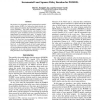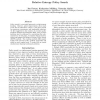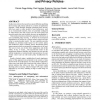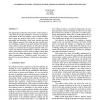122
Voted
IJCAI
2003
15 years 4 months ago
2003
We present an approximate policy iteration algorithm that uses rollouts to estimate the value of each action under a given policy in a subset of states and a classifier to general...
118
Voted
AAAI
2006
15 years 4 months ago
2006
We present a new algorithm, called incremental least squares policy iteration (ILSPI), for finding the infinite-horizon stationary policy for partially observable Markov decision ...
92
Voted
SEC
2008
15 years 4 months ago
2008
Abstract. In recent security architectures, it is possible that the security policy is not evaluated in a centralized way but requires negotiation between the subject who is reques...
113
Voted
IM
2007
15 years 4 months ago
2007
— The objectives of this paper are twofold. First, we introduce a novel policy language, called CIM-SPL (Simple Policy Language for CIM) that complies with the CIM (Common Inform...
118
Voted
DBSEC
2010
15 years 4 months ago
2010
Abstract. Access control mechanisms are used to control which principals (such as users or processes) have access to which resources based on access control policies. To ensure the...
125
Voted
AAAI
2010
15 years 4 months ago
2010
Policy search is a successful approach to reinforcement learning. However, policy improvements often result in the loss of information. Hence, it has been marred by premature conv...
137
Voted
CCS
2008
ACM
15 years 4 months ago
2008
ACM
Studies have shown that users have great difficulty specifying their security and privacy policies in a variety of application domains. While machine learning techniques have succ...
126
Voted
ATAL
2008
Springer
15 years 4 months ago
2008
Springer
In reinforcement learning, least-squares temporal difference methods (e.g., LSTD and LSPI) are effective, data-efficient techniques for policy evaluation and control with linear v...
115
Voted
WSC
2007
15 years 5 months ago
2007
The appropriate production and inventory control policy is a key factor for modern enterprises’ success in competitive environment. In the food industry, most of food manufactur...
124
Voted
AIPS
2010
15 years 5 months ago
2010
Computing a good policy in stochastic uncertain environments with unknown dynamics and reward model parameters is a challenging task. In a number of domains, ranging from space ro...




